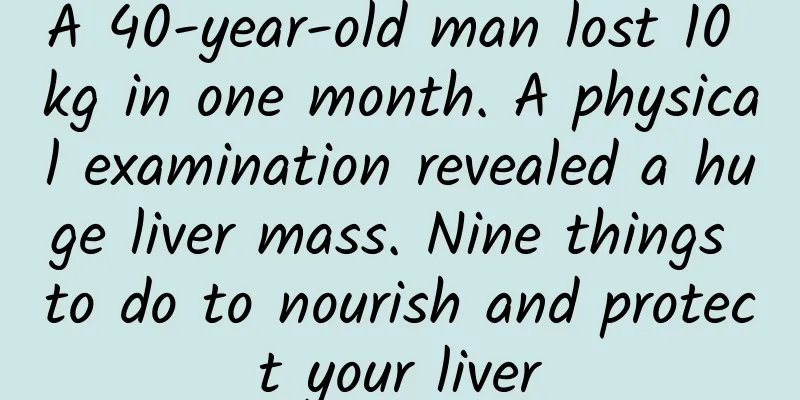A 40-year-old man lost 10 kg in one month. A physical examination revealed a huge liver mass. Nine things to do to nourish and protect your liver

|
Recently, a 40-year-old man lost 10kg in weight in more than a month because of unexplained weight loss. He came to the health management center for a physical examination. The chief physician palpated his abdomen and found that the right upper abdomen was hard. He asked if he had a history of chronic hepatitis. He said he had a history of chronic hepatitis B and long-term alcoholism. He had never had a physical examination before. After further examination, the man was diagnosed with advanced liver cancer... The 22nd "National Liver Care Day" in our country is here. Let’s see how to protect your liver? 1. What is the main function of the liver? 1. A normal and healthy liver has a strong ability to regenerate and repair itself, but chronic inflammation can permanently damage the liver and even develop into cirrhosis, liver cancer or liver failure. 2. The main function of the liver is to metabolize the three major nutrients, including the decomposition of sugar and synthesis of glycogen, the decomposition and synthesis of protein and fat, and the metabolism of vitamins and hormones. 3. It is the largest detoxification organ and the largest digestive gland in the human body. It produces bile and helps digestion and absorption of lipids. 2. What are the risk factors for liver cancer? In my country, hepatitis B virus is the most important risk factor for liver cancer. Other risk factors include hepatitis C virus infection, long-term alcoholism (alcoholic liver disease), non-alcoholic fatty hepatitis, consumption of aflatoxin-contaminated food, schistosomiasis and other causes of cirrhosis, and a family history of liver cancer. Men aged > 40 are particularly at risk. Liver cancer is a silent killer and often has no typical clinical symptoms in the early stages. 3. How to treat liver cancer? 1. Surgical treatment (including surgical resection and liver transplantation) is the preferred treatment for patients with early liver cancer and the only means that can enable patients to achieve long-term survival or even cure. 2. Early diagnosis and treatment of liver cancer are very important. The 5-year survival rate of early liver cancer can reach about 80%, but recurrence and metastasis are still the main obstacles affecting the long-term survival of patients, especially for liver cancer patients. The tumor recurrence and metastasis rate is as high as 40% to 70% 5 years after liver cancer resection, which seriously endangers the patient's life. 3. Regular postoperative check-up is an important way to effectively prevent cancer recurrence and metastasis. 4. However, patients with advanced liver cancer should not give up treatment easily. Some patients can still transform unresectable liver cancer into resectable liver cancer through conversion therapy, and obtain radical resection and long-term survival. 4. The liver is so important, how can we protect it through scientific methods? 1. Eat a light diet. It is recommended to eat a diet that is high in high-quality protein, vitamins, low in sugar, and low in fat; 2. Quit smoking and drinking. In my country, drinkers account for 20% of all deaths from cirrhosis and other chronic liver diseases, and 35.5% of all deaths from liver cancer. Some regional epidemiological surveys show that the proportion of drinkers and the prevalence of alcoholic liver disease in my country are both on the rise. 3. Avoid eating moldy food. For example, aflatoxin was identified as a Class I carcinogen by the World Health Organization in 1993. It is widely found in moldy foods and their products, especially moldy grains and nuts (such as peanuts, corn and their products); 4. Feel happy. "The liver governs emotions", so maintaining a good mood is a good way to nourish the liver; 5. Do appropriate exercise. Do some outdoor activities with a slower pace and less physical effort, such as jogging, walking, doing radio gymnastics, and Tai Chi; 6. Do not abuse drugs. 1) Before taking any medication, you should consult a specialist and follow the doctor's advice. Especially for patients with chronic hepatitis, if you seek medical treatment for other diseases, you must inform the doctor of your condition and choose medications that cause less damage to the liver to avoid aggravating liver damage due to medications. 2) Common drugs that can easily damage the liver include non-steroidal anti-inflammatory drugs, including commonly used painkillers and antipyretics, as well as anti-tuberculosis drugs, some anti-inflammatory drugs, some drugs for treating mental illness, etc. 3) In addition, some Chinese herbal medicines can also damage the liver if taken improperly. 7. Keep a regular schedule. Do not overwork or stay up late, and ensure adequate rest time every day; 8. Pay attention to chronic hepatitis. Patients must receive timely treatment and regular checkups. For example, antiviral drug treatment for chronic hepatitis B, similar to the management of chronic diseases such as hypertension and diabetes, requires long-term regular medication. If the medication is stopped at will, viral rebound, hepatitis activity, worsening of the disease, and even liver failure may occur. While effectively controlling liver disease, pay attention to screening for liver cancer; 9. Prevent liver cancer. 1) Get vaccinated against hepatitis B to prevent hepatitis B infection and further prevent liver cancer caused by it. 2) Effective prevention and treatment of liver cancer should attach great importance to early screening so as to stay away from the risk of liver cancer as much as possible. For high-risk groups such as those with hepatitis B, hepatitis C, long-term heavy drinking, cirrhosis, family history of liver cancer, or those who have eaten food contaminated with aflatoxin, they need to check liver function, alpha-fetoprotein and undergo liver imaging (such as liver B-ultrasound, CT or MRI) at least once every six months. The liver is so important. To take good care of our liver, we not only need to improve our understanding of liver health and establish good habits of nourishing and protecting the liver, but also to do regular physical examinations, which is also something that people need to pay special attention to. |
>>: Does cream strawberry really have cream? Why is cream strawberry called cream strawberry?
Recommend
What does leucorrhea from cervical erosion look like?
Many women who enter married life will develop gy...
Why is there bleeding below the waist pain?
We all know that when women have their periods, t...
What does BV negative mean?
Many women will have a negative leucorrhea BV tes...
What foods are good for the uterus?
Many female friends usually have some gynecologic...
What are the best ways to treat cervical erosion?
Cervical erosion is a common gynecological diseas...
What is bilateral breast thickening?
Breasts are an important symbol of the female bod...
How to treat vaginal itching and leucorrhea
How to treat vaginal itching and excessive leucor...
Areola with fleshy grains
The female breast is a very important sexual orga...
The first child was delivered by cesarean section and the second child could be delivered naturally
If a mother had a caesarean section for her first...
Girls breast development
The most obvious thing about girls during their g...
Is postpartum recovery necessary?
Generally speaking, milk is not easy to get moldy...
Causes of 1st degree cervical erosion
I believe everyone is familiar with the disease o...
Stay away from stroke
There is a disease that can make people lose thei...
How are vegetables kept fresh in the market? What are the recommended methods for keeping vegetables fresh at home?
In life, many people find that the vegetables the...
Does anemia affect menstruation?
In fact, there is no direct relationship between ...









